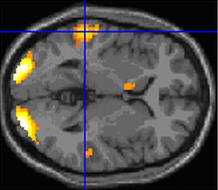A group at the University of Exeter used functional magnetic resonance imaging (fMRI) technology on the brains of 13 volunteers, all faculty members and graduate students in English at the school, to see how they respond to poetry and prose - and then declared that "scientists prove" poetry is like music to the mind.
The upcoming results in the Journal of Consciousness Studies found a "reading network" of brain areas was activated in response to any written material and also that more emotionally charged writing aroused several of the regions in the brain which respond to music.
When the English literature volunteers read one of their favorite passages of poetry, areas of the brain associated with memory were stimulated more strongly than 'reading areas', indicating to the authors that reading a favorite passage is a kind of recollection.

Credit and link: Belfast Telegraph
In a specific comparison between poetry and prose, the team concluded that poetry activates brain areas, such as the posterior cingulate cortex and medial temporal lobes, which have been linked to introspection.
Their brain activity was scanned and compared when reading literal prose such as an extract from a heating installation manual, evocative passages from novels, easy and difficult sonnets, as well as their favorite poetry.

What does it mean? Anything you want. Credit: University of Exeter.
Professor Adam Zeman, a cognitive neurologist from the University of Exeter Medical School, said, "Some people say it is impossible to reconcile science and art, but new brain imaging technology means we are now seeing a growing body of evidence about how the brain responds to the experience of art. This was a preliminary study, but it is all part of work that is helping us to make psychological, biological, anatomical sense of art."





Comments